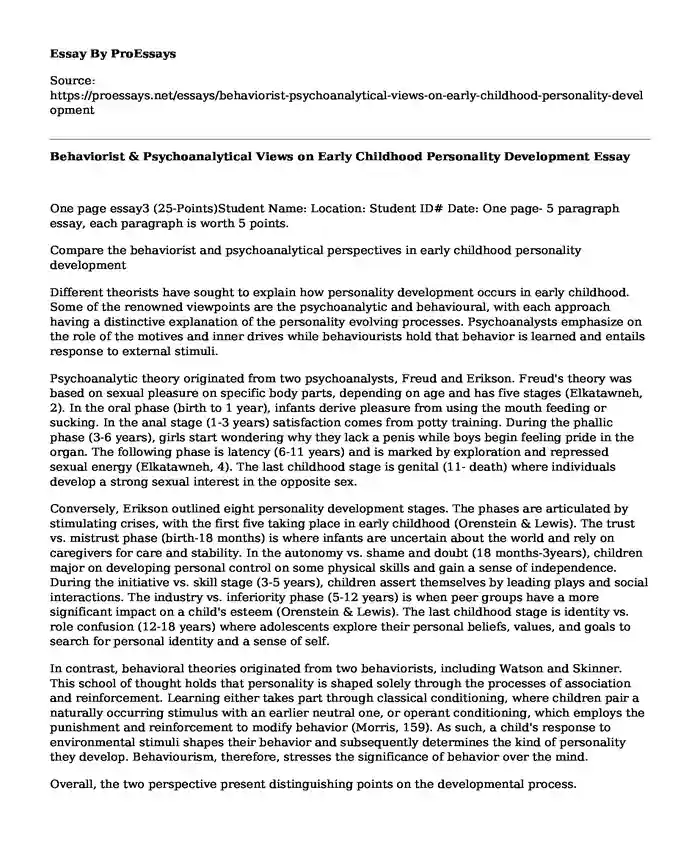One page essay3 (25-Points)Student Name: Location: Student ID# Date: One page- 5 paragraph essay, each paragraph is worth 5 points.
Compare the behaviorist and psychoanalytical perspectives in early childhood personality development
Different theorists have sought to explain how personality development occurs in early childhood. Some of the renowned viewpoints are the psychoanalytic and behavioural, with each approach having a distinctive explanation of the personality evolving processes. Psychoanalysts emphasize on the role of the motives and inner drives while behaviourists hold that behavior is learned and entails response to external stimuli.
Psychoanalytic theory originated from two psychoanalysts, Freud and Erikson. Freud's theory was based on sexual pleasure on specific body parts, depending on age and has five stages (Elkatawneh, 2). In the oral phase (birth to 1 year), infants derive pleasure from using the mouth feeding or sucking. In the anal stage (1-3 years) satisfaction comes from potty training. During the phallic phase (3-6 years), girls start wondering why they lack a penis while boys begin feeling pride in the organ. The following phase is latency (6-11 years) and is marked by exploration and repressed sexual energy (Elkatawneh, 4). The last childhood stage is genital (11- death) where individuals develop a strong sexual interest in the opposite sex.
Conversely, Erikson outlined eight personality development stages. The phases are articulated by stimulating crises, with the first five taking place in early childhood (Orenstein & Lewis). The trust vs. mistrust phase (birth-18 months) is where infants are uncertain about the world and rely on caregivers for care and stability. In the autonomy vs. shame and doubt (18 months-3years), children major on developing personal control on some physical skills and gain a sense of independence. During the initiative vs. skill stage (3-5 years), children assert themselves by leading plays and social interactions. The industry vs. inferiority phase (5-12 years) is when peer groups have a more significant impact on a child's esteem (Orenstein & Lewis). The last childhood stage is identity vs. role confusion (12-18 years) where adolescents explore their personal beliefs, values, and goals to search for personal identity and a sense of self.
In contrast, behavioral theories originated from two behaviorists, including Watson and Skinner. This school of thought holds that personality is shaped solely through the processes of association and reinforcement. Learning either takes part through classical conditioning, where children pair a naturally occurring stimulus with an earlier neutral one, or operant conditioning, which employs the punishment and reinforcement to modify behavior (Morris, 159). As such, a child's response to environmental stimuli shapes their behavior and subsequently determines the kind of personality they develop. Behaviourism, therefore, stresses the significance of behavior over the mind.
Overall, the two perspective present distinguishing points on the developmental process. Psychoanalysis argues that the subconscious human mind is the primary drive while behaviourism holds that behaviors are learnt as an individual responds to external stimuli. Nevertheless, both perspectives present critical insights on the processes involved in moulding personality during the early stages of development.
Works Cited
Elkatawneh, Hassan H. "Freud's Psycho-Sexual Stages of Development." SSRN Electronic Journal, 2013, pp. 1-5, dx.doi.org/10.2139/ssrn.2364215. Accessed 3 Sept. 2020.Morris, Edward K. "THE LEGACY OF JOHN B. WATSON'S BEHAVIORIST MANIFESTO FOR APPLIED BEHAVIOR ANALYSIS." Revista Mexicana de Analisis de la Conducta, vol. 39, no. 2, 2013, pp. 155-179.Orenstein, Gabriel A., and Lindsay Lewis. Eriksons Stages of Psychosocial Development. StatPearls, 2020, NCBI. www.ncbi.nlm.nih.gov/books/NBK556096/. Accessed 3 Sept. 2020.PSY-201 -03: Lifespan Development
Granillo: Fall 2020 Syllabus & Assignments
Cite this page
Behaviorist & Psychoanalytical Views on Early Childhood Personality Development. (2023, Nov 28). Retrieved from https://proessays.net/essays/behaviorist-psychoanalytical-views-on-early-childhood-personality-development
If you are the original author of this essay and no longer wish to have it published on the ProEssays website, please click below to request its removal:
- Isaac Newton Biography
- Paper Example on Radioactivity
- Balanced Molecular Equation and Total Ionic Equation Chemistry Assignment
- Cause of Surface Tension Paper Example
- Statistics on Medical Journal Articles Paper Example
- Global Tanker Sector: Analysis of 2019 Freight Movements - Essay Sample
- Essay Example on East-Asian Realm: Monocentric or Polycentric?







